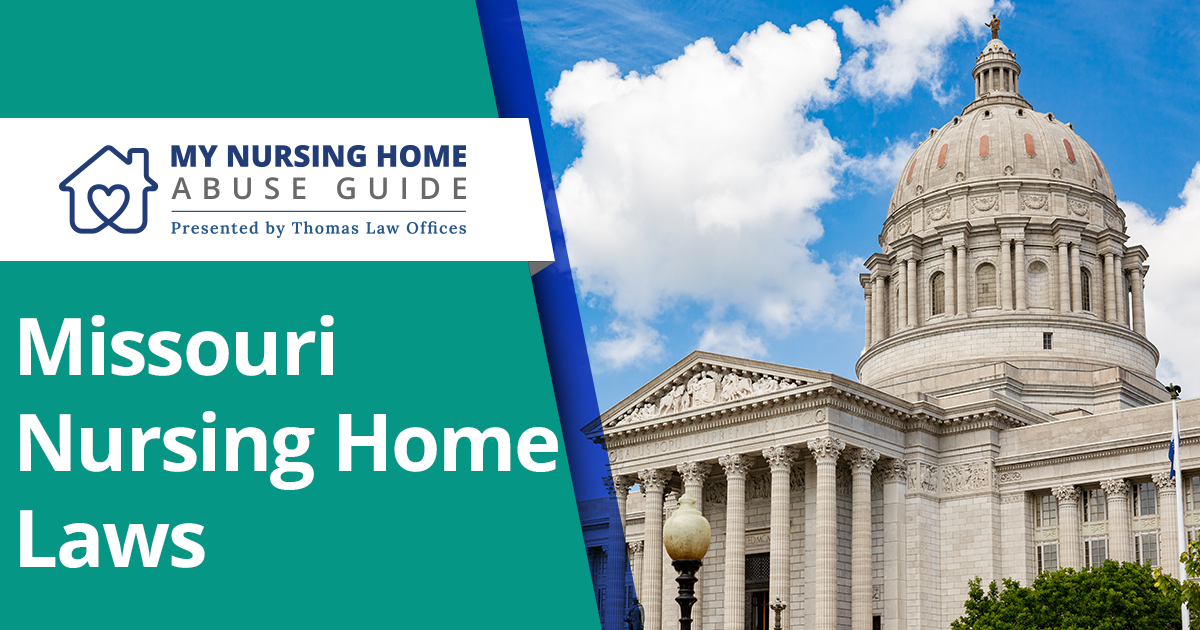Your Guide to Nursing Home Abuse & Prevention
Millions of elderly adults live in nursing home facilities.
Every one of them deserves to feel safe, protected, and respected.
Millions of elderly adults live in nursing home facilities.
Every one of them deserves to feel safe, protected, and respected.

According to the 2020 U.S. Census, roughly 1,290,000 Americans currently reside in nursing homes, 38,351 of whom are in Missouri alone.
That number is expected to almost double by 2050.
Clearly, navigating the complex landscape of Missouri nursing home laws is essential for both residents and their families. Understanding these regulations can help ensure that loved ones receive the quality care and protection they deserve.
Missouri has established comprehensive laws and regulations to protect the rights and well-being of residents.
These laws cover various aspects of care and facility operations to ensure that residents receive adequate support and protection. By familiarizing themselves with these, families can advocate for their loved ones and hold facilities accountable for maintaining high standards of care.
One of the fundamental aspects of nursing home laws in Missouri is the protection of resident rights.
Resident rights are essential safeguards designed to protect the well-being, dignity, and autonomy of individuals living in long-term care facilities. Understanding these rights empowers residents and their families to advocate for quality care and hold facilities accountable for upholding ethical standards.
These rights include (but aren’t limited to):
Resident rights serve as the foundation for ensuring that individuals receive compassionate, dignified, and person-centered care in long-term care settings. By understanding and advocating for these rights, residents and their families can promote accountability, improve quality of life, and create a culture of respect and dignity within these nursing care facilities.
Nursing homes are required to respect and uphold these rights for all residents, providing a safe and supportive environment where individuals can live with dignity and independence.
The Missouri Department of Health & Senior Services recognizes approximately 1,161 long-term care facilities with more than 83,900 beds licensed and inspected within the state, as well as eight hospital-based long-term care units.
Missouri nursing home laws also outline specific requirements for facility operations to ensure the delivery of quality care. These requirements cover areas such as staffing ratios, medical care standards, safety regulations, and record-keeping practices.
By adhering to these requirements, employees can provide a safe and nurturing environment for residents, promoting their overall health and well-being.
In cases where these residences fail to meet the standards outlined in Missouri law, residents and their families have legal recourse to address violations and seek justice. Legal options may include filing complaints (including online reporting of non-emergencies) with a Long-Term Care Ombudsmen or state regulatory agencies, pursuing civil litigation against negligent facilities, or seeking assistance from advocacy organizations specializing in elder rights.
By taking action against violations, individuals can protect their loved ones and hold facilities accountable for substandard care.
Navigating Missouri nursing home laws can be challenging, but it’s essential for ensuring the well-being and safety of loved ones in residential care. By understanding resident rights, facility requirements, and legal recourse options, families can advocate for quality care and hold these assisted living facilities accountable for their obligations.
Our state laws work in conjunction with federal laws and regulations to create a system where every resident in Missouri receives the respect, dignity, and support they deserve.
This website was created and is maintained by the legal team at Thomas Law Offices. Our attorneys are experienced in a wide variety of nursing home abuse and neglect cases and represent clients on a nationwide level. Call us or fill out the form to the right to tell us about your potential case. We will get back to you as quickly as possible.
866-351-2504